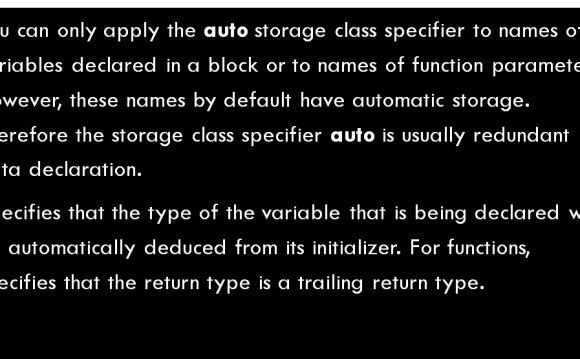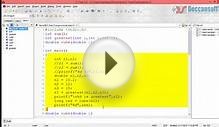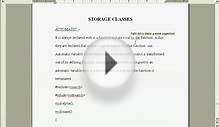
a storage space course defines the range (visibility) and life time of variables and/or features within a C system.
You will find following storage space courses which can be used in a-c system
- auto
- register
- fixed
- extern
auto - Storage Space Class
car could be the standard storage space course for all local factors.
{ int Count; auto int Month; }
The example above defines two variables with similar storage course. auto can just only be utilized within functions, for example. neighborhood variables.
register - Storage Class
sign-up is used to define local factors which should be kept in a register instead of RAM. This means that the variable has an optimum dimensions corresponding to the sign-up size (usually one word) and cannot possess unary '&' operator put on it (because does not have a memory area).
Enroll should only be used for factors that need quick access - such counters. It must also be mentioned that defining 'register' goes maybe not imply that the adjustable would be stored in a register. It means so it MIGHT be stored in a register - based hardware and implimentation restrictions.
fixed - Storage Class
fixed is the standard storage space course for global factors. Both factors below (matter and roadway) both have a static storage class.
fixed int Count; int path; { printf("%d\n", Road); }
fixed factors can be 'seen' within all features within origin file. At website link time, the fixed factors defined here will never be seen by the item modules which are introduced.
static could be defined within a function. Should this be done the variable is initalised at run time but is not reinitalized as soon as the function is called. This inside a function fixed variable maintains its worth during vairous calls.
void func(void); static count=10; /* international adjustable - static is the default */ main { while (count-) { func; } } void func( void ) { static i = 5; i++; printf("i is %d and count is %d\n", i, count); } this can create after result i is 6 and matter is 9 i is 7 and count is 8 i is 8 and count is 7 i is 9 and count is 6 i is 10 and matter is 5 i is 11 and count is 4 i is 12 and count is 3 i is 13 and count is 2 i is 14 and count is 1 i is 15 and count is 0
NOTE : Here search term void indicates function will not return anything and it also will not just take any parameter. You can easily memoriese void as nothing. fixed factors are initialized to 0 automatically.
Definition vs Declaration : Before proceeding, why don't we understand the distinction between defintion and statement of a variable or function. Meaning indicates in which a variable or purpose is defined in realityand actual memory is allocated for variable or function. Declaration suggests just providing a reference of a variable and purpose. Through statement we guarantee on complier that variable or purpose has-been defined elsewhere within the program and you will be supplied during linking. When you look at the preceding instances char *func(void) has been put at the top that is a declaration for this function where as this purpose has-been defined below to top function.
Discover one more extremely important usage for 'static'. Look at this bit of rule.
char *func(void); primary { char *Text1; Text1 = func; } char *func(void) { char Text2[10]="martin"; return(Text2); }
Now, 'func' returns a pointer towards the memory place where 'text2' begins BUT text2 features a storage space class of 'auto' and will disappear when we exit the big event and may be overwritten but something else. The answer would be to specify
RELATED VIDEO











